

Nearly 90 percent of excepted employees who took a recent Federal News Network survey about their experiences during the 35-day government shutdown said morale is...
Best listening experience is on Chrome, Firefox or Safari. Subscribe to Federal Drive’s daily audio interviews on Apple Podcasts or PodcastOne.
Federal employees who kept the ships running during the 35-day government shutdown have said they fear the most recent lapse will leave a permanent mark on them and their colleagues.
Some excepted employees said they’re worried how the government shutdown would ultimately impact their future credit scores and finances.
Many are concerned their colleagues, especially young or recent hires, are looking for other work.
Others lamented the time it would take after the government shutdown to trudge through a backlog of work and meet unfilled hiring demands.
But several excepted employees said the recent shutdown, the longest in U.S. history, ultimately soured their opinion of the government as both an institution and an employer.
“I am not sure how many times this can happen to me or my colleagues,” one excepted employee said in response to a recent Federal News Network survey on the government shutdown. “Whether it’s the fear of having to buy groceries or pay rent/mortgages with no income, the ability to just function on the job when systems are broken and cannot be fixed due to the furlough, or having to ignore requests from the public because we’re not funded to engage on that project, this is a horrible situation. It’s unsustainable.”
Nearly 90 percent of excepted employees who took an anonymous Federal News Network survey last week said morale at their agency was worse off now than it was before the government shutdown began in late December. A single person said morale at their agency had improved after the shutdown, and nearly 10 percent said it remained the same.
“It is horrible to work without pay, protecting the lives and property of people who don’t care about the shutdown affects you,” one respondent said. “Never have [I] seen morale so low.”
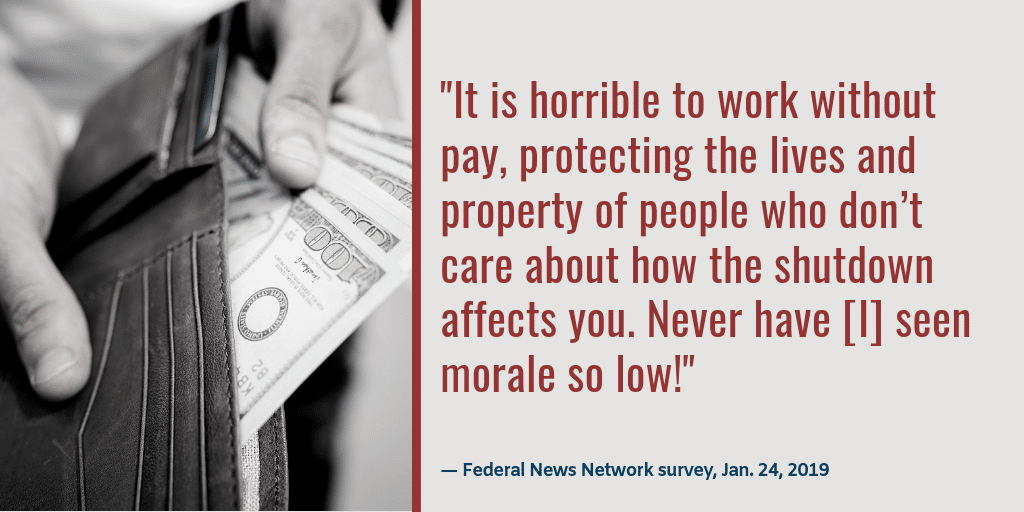
Federal News Network received responses from 1,013 furloughed employees, excepted workers and contractors. A little more than 400 people described themselves as “excepted employees” during the government shutdown.
“My agency is already in the lowest rankings for morale, but the no-pay status drags us even lower,” another excepted employee said. “Trying to manage our financial responsibilities, continually getting mixed messages about who can legally do what (accepting resources provided to keep feds afloat), believing the furlough won’t last another week … only for it to continue. Being used as pawns in political gaming is a crisis to the integrity and loyalty commonly provided by federal employees trying to serve the nation.”
Many excepted employees said their morale in particular had taken a hit during the government shutdown knowing they specifically had been asked to come to work while their colleagues were furloughed at home.
Excepted employees said it’s unfair everyone will eventually get paid, even though their furloughed colleagues spent the past 35 days at home.
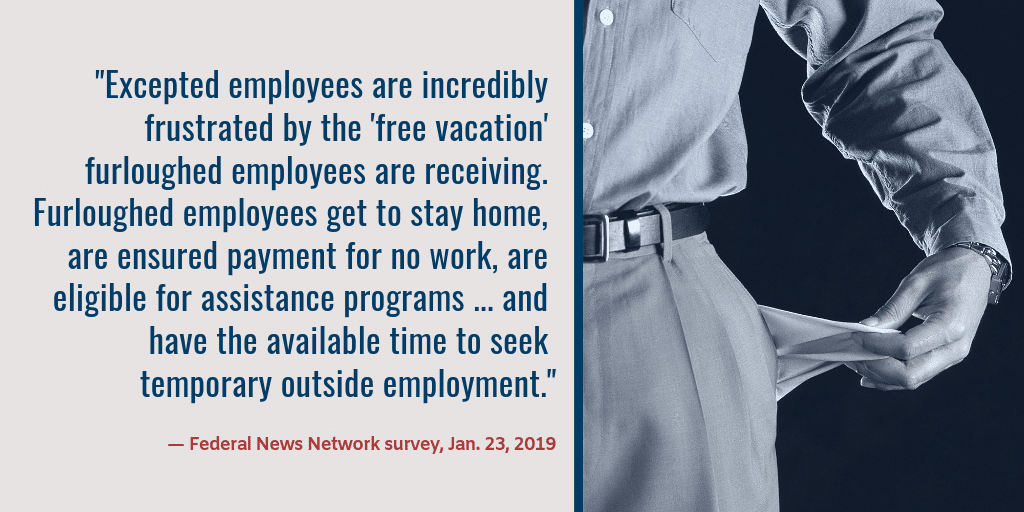
“Excepted employees are incredibly frustrated by the “free vacation” furloughed employees are receiving,” one respondent said. “Furloughed employees get to stay home, are ensured payment for no work, are eligible for assistance programs (e.g. unemployment benefits) and have the available time to seek temporary outside employment.”
Excepted employees don’t have the time to drive for a ride-sharing app or apply to be a substitute teacher, respondents said.
More than 81 percent of excepted respondents said their ability to pay for the basics during the recent government shutdown was their number one concern.
Excepted employees said their conversations at work were consumed with financial concerns.
“We are in the midst of selling and buying a house, relocating, and my husband is retiring next week,” one excepted employee said. “My salary is our main source of income, and waiting for closing we can’t use our credit cards. Our realtor told us that one fed customer’s mortgage loan had been denied because of shutdown. [We’re] holding our breath until we sign papers next week and then hope our savings will carry us until I finally get paid.”
Others said the sheer uncertainty of not knowing when they would get posed the biggest challenges. One excepted employee said the shutdown had thrown wedding plans into disarray.
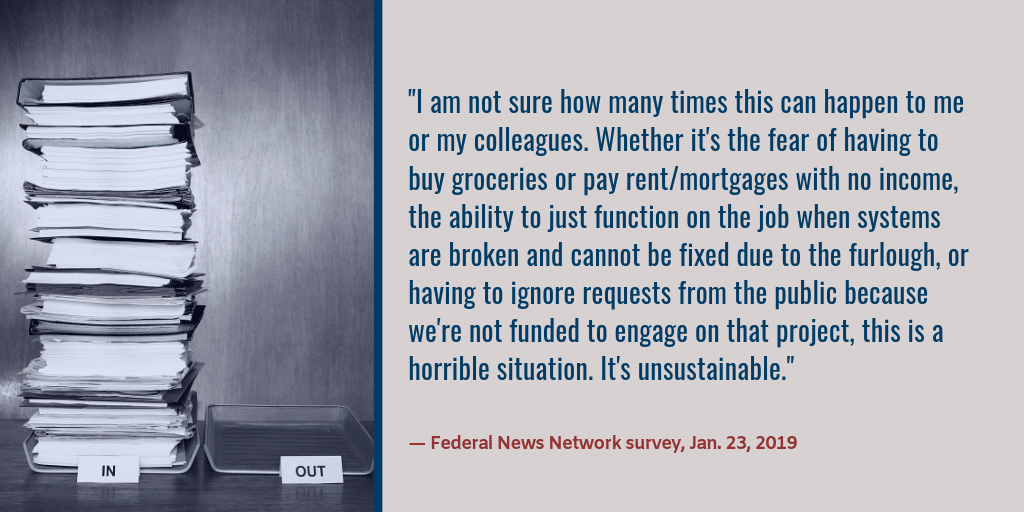
A few excepted employees said they had saved for this very scenario. Others said they would try to set aside extra funds in the event that a prolonged government shutdown happens again.
“What happens next year, and the year after that?” one employee said. “And then the year after that?”
Excepted employees expressed other frustrations about their time spent working during the government shutdown.
A majority said their number one challenge while working through the shutdown was the sheer lack of support staff to answer human resources, finance, budget and other questions.
Lack of supplies, tools and training was the second most frustrating aspect of work life during the government shutdown.
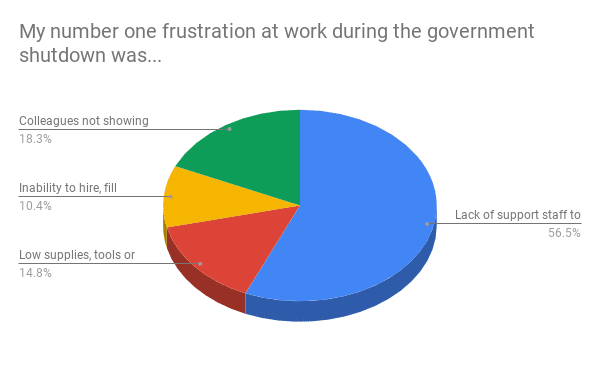
Many excepted employees expressed concern or stress over work that wasn’t getting done during the government shutdown.
One respondent said his work unit had missed at least four in-depth reviews of air traffic facilities during the government shutdown.
Others said they and a handful of colleagues were handling phone calls that typically require the time and attention of dozens of employees to address.
“As this shutdown continues, more TSA officers quit and find other jobs,” another respondent said. “It is putting much more stress on the remaining officers to pick up the slack. We are expected to screen the same amount of passengers with [fewer] officers. Plus it will take many months to hire and train replacements.”
And while 78 percent said recouping lost pay and benefits was their biggest concern after the shutdown ended, rebuilding employee engagement and morale came in a close second.
Meanwhile, a handful of respondents said they were actively considering retirement or leaving altogether.
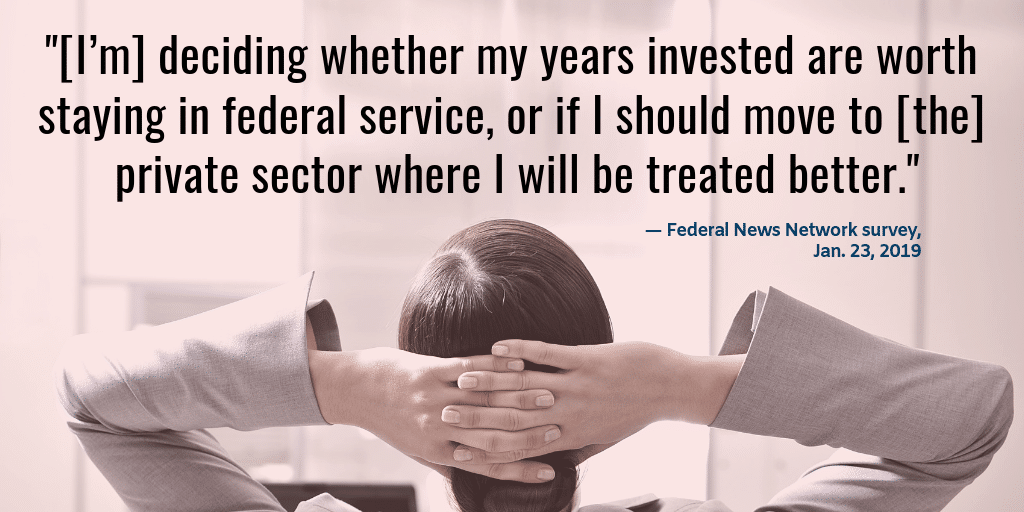
“[I’m] deciding whether my years invested are worth staying in federal service, or if I should move to [the] private sector where I will be treated better,” one employee said.
Another respondent said his work partner would probably leave when the government shutdown ended.
“She is looking for another job,” the employee said. “[She] has a son in college [and] must be able to pay those expenses. It’s a shame; she is very talented.”
Graphics by Amelia Brust
Copyright © 2025 Federal News Network. All rights reserved. This website is not intended for users located within the European Economic Area.
Nicole Ogrysko is a reporter for Federal News Network focusing on the federal workforce and federal pay and benefits.
Follow @nogryskoWFED



